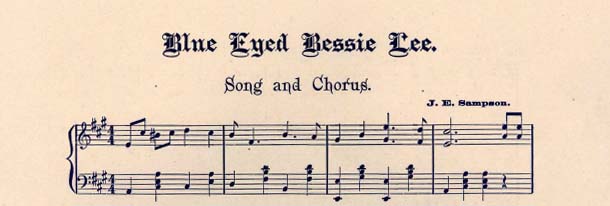
Historic Sheet Music Collection
Document Type
Score
Publication Date
1866
Lyrics
Out in the gloomy night, sadly I roam,
I have no Mother dear, no pleasant home;
No body cares for me no one would cry
Even if poor little Bessie should die.
Barefoot and tir'd, I've wanderd all day
Asking for work but I'm too small they say;
On the damp ground I must now lay my head.
CHORUS
Mother, why did you leave me all alone,
With no one to love me, no friends and no home?
Dark is the night, and the storm rages wild,
God pity Bessie, the Drunkard's lone child!
We were so happy till Father drank rum,
Then all our sorrow and trouble begun;
Mother grew paler, and wept every day,
Baby and I were too hungry to play.
Slowly they faded, and one Summer's night
Found their dear faces all silent and white;
Then with big tears slowly dropping I said:
"Father'd a Drunkard, and Mother is dead!"
Oh! if the "Temp'rance men" only could find
Poor, wretched Father, and talk very kind
If they could stop him from drinking why, then
I should be so very happy again!
Is it too late? "men of Temp'rance," please try,
Or poor little Bessie may soon starve and die.
All the day long I've been begging for bread.
Recommended Citation
Parkhurst, E.A. and Stella, "Father's A Drunkard And Mother Is Dead" (1866). Historic Sheet Music Collection. 379.
https://digitalcommons.conncoll.edu/sheetmusic/379
The views expressed in this paper are solely those of the author.
Comments
To all "True Sons of Temperance."
"Father's a drunkard and mother is dead"
Song and Chorus as sung by Little Effie Parkhurst.
At the Great Temperance Gatherings in New-York.
Poetry by Stella.
Of good samaritan division No.1 Washington, D.C.
Music by Mrs. E.A. Parkhurst.
Author of "Don't marry a man if he drinks" "I'll marry no man if he drinks" "Looking forward" & C & C.
Washington, D.C. Published by John F. Ellis, 306 Pennsylvania Ave.
Some of these resources may contain offensive language or negative stereotypes. Such materials should be seen in the context of the time period and as a reflection of the attitudes of the time. The items are part of the historical record, and do not represent the views of the libraries or the institution.